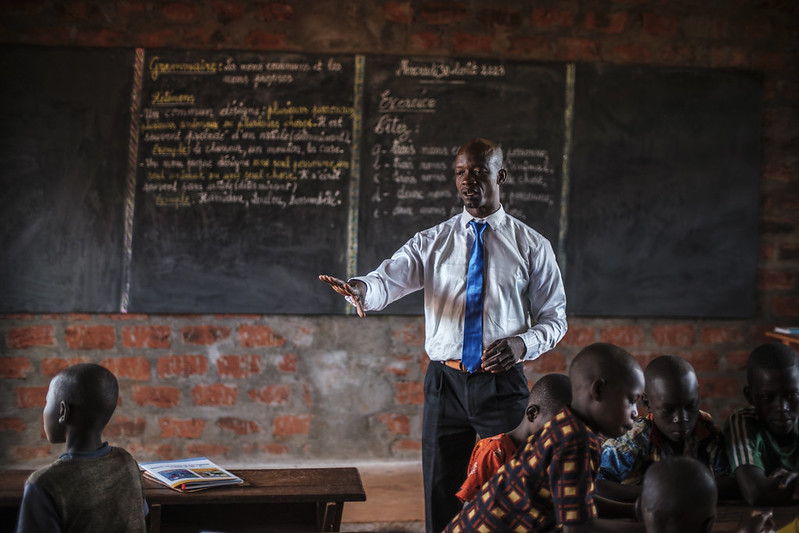Realizing the Triple Nexus: Upcoming NORRAG Policy Insights Celebrates the Central Role of Teachers.
By Alison Joyner & Christopher Henderson
Marking World Teachers Day 2025, NORRAG celebrates the central role played by teachers in making a reality of the Humanitarian-Development-Peace Nexus. In December 2025 NORRAG will be launching its sixth Policy Insights publication titled The Triple Nexus at 10: What We’ve Learned and Where We Go From Here. The publication gathers 40 contributions from a wide range of practitioners and researchers from diverse geographies. Over 100 authors contributed, half of whom are from the Global South.
Across the Policy Insights submissions, teachers emerge as the most consistent and tangible embodiment of the Humanitarian–Development–Peace (HDP) Nexus in education. No other group appears across as many contributions, geographic contexts, or theoretical framings. A quarter of the contributions demonstrate explicitly how teacher-centred approaches make the abstract idea of the nexus actionable, measurable, and human. From classrooms in the Democratic Republic of Congo, to refugee settlements in Uganda, or early childhood initiatives in Pakistan, teachers translate nexus principles—coherence, resilience, and peacebuilding—into daily practice.
Yusuf Sayed and Sally Beiruti (Cambridge University, United Kingdom) position teachers as ethical and justice-oriented peace actors within education systems, necessarily not neutral. They advocate for teacher agency and rights as foundational for a nexus approach, arguing that just peace is a condition for effective humanitarian aid and system stabilisation, not a result of them. Their emphasis on the need to respect teacher agency and rights is picked up by Loise Gichuhi (University of Nairobi, Kenya) who calls for the inclusion of teachers in decision-making.
Katrina Barnes (Jigsaw Education), illustrates how this can be facilitated, based on research being conducted by refugee teachers in Zambia, Uganda and Chad. Enabled through the project to participate in discussions with decision-makers about refugee teacher inclusion in national systems, refugee teachers’ enhanced wellbeing and autonomy should help build long-term peace and resilience while supporting humanitarian and development goals.
Sabrina Hervey, Mohamud Hure, and Ikram Sellami (Education Above All) highlight how the integration of refugee teachers into national payrolls in Malawi, Rwanda, and Uganda builds systemic resilience and accelerates inclusion efforts across humanitarian and development spheres. In contrast, Yeo’s (Hannam University, South Korea) work on the Thailand / Myanmar border exposes systemic neglect of refugee teachers who sustain education in the most challenging conditions. She argues that accredited pathways and psychosocial support are critical to realising equitable nexus outcomes.
Becky Telford and Jennie Taylor (UNHCR) highlight the substantial investments required to include refugee teachers in national systems, which can enhance education quality while fostering long term refugee inclusion, social cohesion, and economic opportunity. Laurence Beruin (University of the Philippines Los Baños) illustrates this in practice: teacher well-being and reflective practice foster community resilience and sustainable development, directly linking individual welfare to peace outcomes. In Pakistan, Sacha Innes (Right to Learn Afghanistan) documents how teacher professional development in Afghan refugee villages fosters social cohesion and peace through a “pedagogy of care,” linking humanitarian response to peacebuilding via teacher practice.
The PlayMatters team of Anne Smiley, Lillian Viko, Jonathan Kwok, Danielle Falk, Arianna Pacifico (IRC), Mary Winters (LEGO Foundation) and Rena Deitz (New York University, United States), demonstrates how teacher support and policy alignment focused on play-based pedagogies in Ethiopia, Tanzania, and Uganda can bridge short-term emergency responses with long-term system strengthening objectives.
Collectively, these contributions powerfully exemplify how investing in teacher well-being, professional development, and inclusion – including the recognition of refugee teachers – yields benefits across all three pillars of the nexus. Teachers who are supported, trusted, and trained in psychosocial and inclusive pedagogy, sustain learning during emergencies, strengthen national education systems, and foster social cohesion. Teachers are front-line architects of the HDP nexus, operationalising it at multiple levels: classroom, community, system, and policy.
If you would like to receive information about the publication and online launch, sign up to our events newsletter using the form at the bottom of this page.
You can learn more about refugee teachers’ work and well-being in NORRAG’s 2023 Policy Insights: Refugee Teachers: The Heart of the Global Refugee Response.

